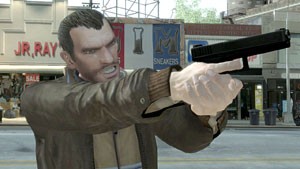Prostitutes, car chases, plenty of body bags and enough swear words to make a sailor blush.
They’re the bread and butter of the Grand Theft Auto video game series, whose latest, highly anticipated installment hits stores today.
“”Grand Theft Auto 4″” is widely estimated to sell at least six million copies in its first week, likely to the dismay of critics who believe the game encourages youths to commit acts of violence.
While many such high-profile incidents have involved teenagers, some UA students don’t believe the game’s reputation is necessarily apt.
Business freshman Phil Krueger plans to purchase the new game over the summer for his Xbox 360. He believes Grand Theft Auto encourages violence “”to an extent, but it depends on who the person is and how they view the game, whether as a game or as a real-life simulation.””
He said he has never been personally motivated to commit violence after playing.
“”After I play, it’s satisfaction,”” he said. “”It’s nothing more than that.””
“”Grand Theft Auto 4,”” in line with its predecessors, puts the gamer in the shoes of a criminal who has an entire city to explore. It is a virtual world in which virtually anything – particularly crimes like robbing a store, murder and carjacking – is possible.
In 2005, 18-year-old Devin Moore killed three officers in Fayette, Ala., and used the defense he had become insane playing Grand Theft Auto.
After his arrest, he said, “”Life is like a video game. You have to die sometime.””
In 2006, detectives in Oakland, Calif., alluded to the game provoking a street gang to rob and kill six people, while in 2003 two teenagers in Newport, Tenn., told authorities the game influenced their decision to shoot at passing cars with a rifle.
Critics have argued that the production of games offering game play similar to that of Grand Theft Auto are harming society.
In a 2005 CBS interview, Jack Thompson, a Miami attorney and crusader against video game violence, said, “”Devin Moore was, in effect, trained to do what he did. He was given a murder simulator.””
Washington D.C. attorney Paul Smith represented the Entertainment Software Association in a 2005 lawsuit brought by the state of Illinois to limit youth access to violence video games. In an interview that year with CBS, he called the fervor over games like Grand Theft Auto another example of an older generation raising outcry over a controversial new product.
“”It’s the subject of almost a hysterical attack,”” he told CBS. “”If you went back to the 1950s, it’s hard to believe now, but comic books were blamed for juvenile delinquency.””
Journalism junior Chad Roy believes college students are less likely to commit crimes after playing violent video games “”because they know the difference between life and a game.””
Trinity Donovan, a customer at Game Stop, 2910 N. Campbell Ave., who has had his copy of “”Grand Theft Auto 4″” reserved for more than a month, said people “”have to be realistic”” about allowing what they see on the screen to affect their actions.
“”You can’t hit the reset button on life. Some people will never get that,”” he said. “”But you have to understand, it’s not just video games – it’s movies, music. Everything people find entertaining can be dangerous to the wrong people.””
The University of Arizona Police Department did not return calls seeking comment yesterday.
– Tom Knauer contributed to reporting









